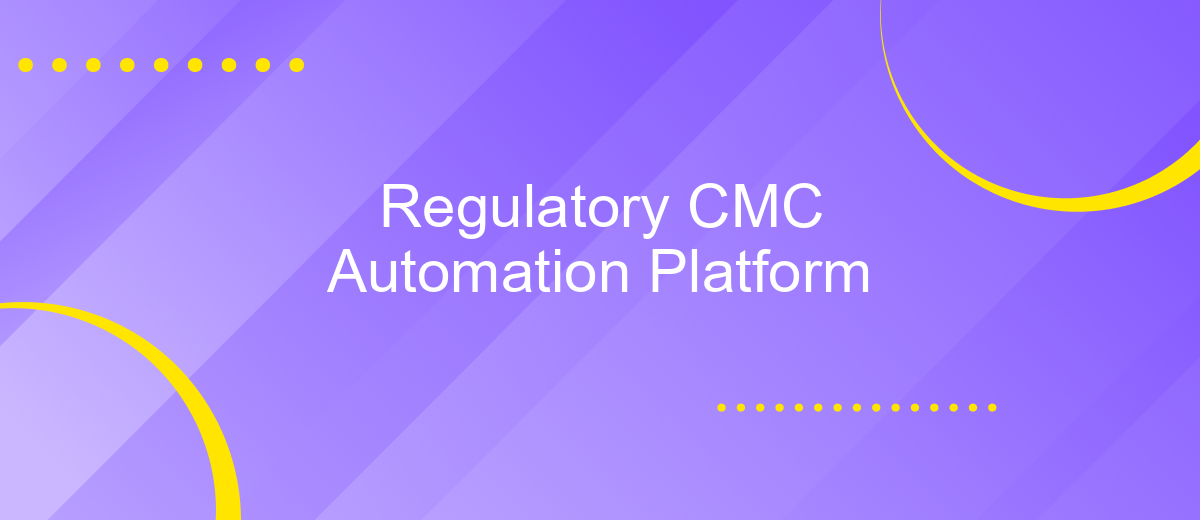Regulatory CMC Automation Platform
In today's rapidly evolving pharmaceutical landscape, the need for efficient and compliant Chemistry, Manufacturing, and Controls (CMC) processes is more critical than ever. The Regulatory CMC Automation Platform emerges as a transformative solution, streamlining regulatory submissions and ensuring data accuracy. By automating complex workflows, this platform not only enhances operational efficiency but also accelerates time-to-market, empowering companies to meet stringent regulatory demands with confidence.
Introduction: The Need for CMC Automation
In the rapidly evolving pharmaceutical industry, the demand for efficient and reliable processes is paramount. Chemistry, Manufacturing, and Controls (CMC) is a critical component in drug development, ensuring that products meet quality standards and regulatory requirements. However, traditional CMC processes are often labor-intensive, time-consuming, and prone to human error, which can lead to delays in bringing new drugs to market. The need for automation in CMC processes is becoming increasingly apparent as companies strive to enhance productivity and maintain competitiveness.
- Streamline data management and integration across various departments.
- Reduce the risk of human error and improve data accuracy.
- Accelerate the regulatory submission process and approval timelines.
- Enhance collaboration and communication among cross-functional teams.
By automating CMC processes, pharmaceutical companies can not only improve operational efficiency but also ensure compliance with stringent regulatory standards. Automation enables the seamless integration of data, fostering a more agile and responsive development environment. As the industry continues to innovate, embracing CMC automation is essential for companies to remain competitive and deliver high-quality products to patients swiftly and safely.
Key Features of a Regulatory CMC Automation Platform

The Regulatory CMC Automation Platform is designed to streamline and enhance the efficiency of regulatory compliance processes in the pharmaceutical industry. One of its key features is the integration of advanced data management tools that ensure seamless data collection, storage, and retrieval. This platform supports robust document management systems that facilitate the creation, review, and approval of essential regulatory documents, thereby reducing the risk of errors and non-compliance. Additionally, the platform offers real-time analytics and reporting capabilities, providing users with actionable insights to make informed decisions quickly.
Another significant feature is its ability to integrate with existing systems through flexible API connections. Utilizing services like ApiX-Drive, the platform can effortlessly connect with various software applications, ensuring smooth data flow across different departments. This integration capability not only enhances operational efficiency but also allows for the customization of workflows to meet specific regulatory requirements. Furthermore, the platform boasts a user-friendly interface, making it accessible to users with varying levels of technical expertise, thereby facilitating widespread adoption and utilization across the organization.
Benefits of Implementing a CMC Automation Platform

Implementing a CMC (Chemistry, Manufacturing, and Controls) Automation Platform offers significant advantages for pharmaceutical companies. By streamlining regulatory processes, these platforms enhance efficiency, reduce human error, and accelerate time-to-market for new products. Automation facilitates better data management and compliance, ensuring that all regulatory requirements are met accurately and promptly. This technological advancement not only optimizes operational workflows but also supports strategic decision-making through comprehensive data analytics.
- Increased Efficiency: Automation reduces manual tasks, allowing teams to focus on more strategic activities.
- Error Reduction: Automated systems minimize human errors, ensuring greater accuracy in regulatory submissions.
- Faster Time-to-Market: Streamlined processes enable quicker product approvals, giving companies a competitive edge.
- Enhanced Data Management: Centralized data systems improve data integrity and accessibility.
- Regulatory Compliance: Automation ensures adherence to complex regulatory standards, reducing compliance risks.
Overall, adopting a CMC Automation Platform positions pharmaceutical companies to navigate the regulatory landscape more effectively. By leveraging technology, organizations can achieve greater agility and responsiveness in an ever-evolving industry. This proactive approach not only strengthens compliance but also drives innovation and growth, ultimately benefiting both the company and its consumers.
Case Studies and Examples of Successful Implementation

In the rapidly evolving pharmaceutical industry, the implementation of a Regulatory CMC Automation Platform has proven to be a game-changer for many companies. By streamlining the complex processes of Chemistry, Manufacturing, and Controls (CMC), these platforms have led to significant improvements in efficiency and compliance.
One notable example is a leading biotech firm that integrated a CMC automation platform into its operations. This integration not only accelerated their product development timelines but also ensured a higher level of regulatory compliance, reducing the risk of costly delays.
- A global pharmaceutical company reported a 30% reduction in document preparation time.
- Another firm achieved a 25% decrease in regulatory submission errors, enhancing their approval rates.
- A mid-sized biotech enterprise saw a 40% improvement in cross-departmental collaboration.
These success stories highlight the transformative impact of CMC automation platforms. By adopting these technologies, pharmaceutical companies can not only enhance their operational efficiency but also ensure they remain competitive in a highly regulated industry.
Choosing the Right CMC Automation Platform for Your Needs
When selecting a CMC automation platform, it's crucial to assess your organization's specific needs and objectives. Start by identifying the key features that are essential for your operations, such as data management, compliance tracking, and reporting capabilities. Evaluate the scalability of the platform to ensure it can grow alongside your business. Consider the user-friendliness of the interface, as a more intuitive design can facilitate smoother adoption and minimize training time for your team.
Integration capabilities are another vital aspect to consider. A platform that seamlessly integrates with existing systems can enhance efficiency and reduce data silos. Services like ApiX-Drive offer robust integration solutions, enabling you to connect various applications without extensive coding knowledge. Additionally, assess the level of customer support and technical assistance provided by the platform vendor. Reliable support can be invaluable, particularly during the initial implementation phase. By carefully considering these factors, you can choose a CMC automation platform that aligns with your organizational goals and enhances your regulatory processes.
FAQ
What is a Regulatory CMC Automation Platform?
How does a Regulatory CMC Automation Platform improve compliance?
Can a Regulatory CMC Automation Platform integrate with existing systems?
What are the benefits of using a Regulatory CMC Automation Platform?
Is it difficult to implement a Regulatory CMC Automation Platform?
Apix-Drive will help optimize business processes, save you from a lot of routine tasks and unnecessary costs for automation, attracting additional specialists. Try setting up a free test connection with ApiX-Drive and see for yourself. Now you have to think about where to invest the freed time and money!

